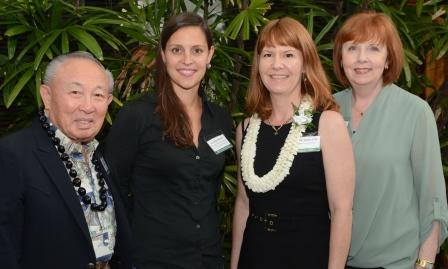Health Care Economist Dr. Joanne Spetz Addressed “Nurse Surges and Shortages: Can We Reach Balance?” at the 2015 UH Manoa Nursing Dean’s Lecture
Sponsored by the “Starlit Walk Present: Endowment for the Advancement of Nursing”
The 2015 UH Manoa Nursing Dean’s Lecture featured Dr. Joanne Spetz, PhD, who presented her health policy study called, “Nurse Surges and Shortages: Can We Reach Balance?,” on March 31, 2015 at the Pacific Club. The timely topic attracted health care professionals from hospital to home care administrators, nurse managers, nursing faculty, and current nursing students.
Dr. Spetz shared her perspectives on the challenges the health care industry faces in providing opportunities for new RNs. Research shows that challenge facing us in Hawaii is similar to what California, and much of the rest of the nation, is experiencing. She addressed the historical cycles of surplus and shortage of registered nurses (RNs), from the widespread and severe nursing shortages in early 2000s, up to current reports of newly-graduated RNs having difficulty finding employment.

Recent forecasts of supply and demand for RNs published by the U.S. Bureau of Health Workforce indicate that some states may have a surplus of RNs in the future, suggesting that RNs may face longer-term challenges finding work. However, Dr. Spetz warns that if the industry does not monitor the nursing workforce supply and demand, it may inadvertently find itself in another nursing shortage. Typically, when job opportunities diminish, demand for the educational program also diminishes. Prospective students are discouraged and choose a field with better employment prospects. Second, schools are responsible to ensure that graduates have a real opportunity to get jobs and decrease enrollment when market demand is low. This sets us up for a cycle of shortages followed by surges.
Dr. Spetz noted:
- The nursing workforce is critical to transforming the health care system. Nursing is the largest group of licensed health professionals, outnumbering physicians 4 to 1.
- Decline in demand for RNs is partly due to the recession of 2007-2009, resulting in fewer retirements, combined with substantial increases in enrollments in schools of nursing.
- Ensuring an adequate number of well-educated nurses is essential to patient care and efficiency.
- Understanding labor markets and correlating factors is essential in tracking and forecasting workforce supply and demand.
- Hospitals and employers have shared responsibility in ensuring an adequate RN workforce.
Spetz said that in Hawaii, there are more than 21,000 licensed RNs and the supply of nurses in Hawaii has been fairly stable. She noted that the data shows that more new nursing graduates in their twenties and thirties are leaving Hawaii to find jobs elsewhere due to the high cost of living and limited number of employment opportunities.
Due to the range in data and forecasts from several difference sources, Dr. Spetz advised us to continue working together to track the supply and demand of nurses with the goal of forecasting two to three years ahead, and continue investing in nursing education in order to maintain a skilled nursing workforce supply in Hawaii. She also advises organizations to develop new graduate residency programs to provide a bridge to specialties and give nurses opportunities to gain experience and that new graduates continue their education to be prepared when positions become available. Dr. Spetz advised that hiring new nursing graduates now would reduce recruiting and inflated wage expenses later – in the case of another shortage.
Dr. Spetz is a Professor at the Institute for Health Policy Studies and the Department of Family and Community Medicine and the School of Nursing at the University of California, San Francisco. She is the Associate Director for Research Strategy at the UCSF Center for the Health Professions and the Director of the UCSF Health Workforce Research Center. Dr. Spetz received her Ph.D. in economics from Stanford University after studying economics at the Massachusetts Institute of Technology and is an Honorary Fellow of the American Academy of Nursing.
The UHM Nursing Dean’s Lecture is made possible by the generosity of Charlie and Preston Fox, who established the “Starlit Walk Present: Endowment for Advancement of Nursing,” a fund to bring nationally renowned speakers to Hawaii to educate students, alumni, and nursing and other healthcare professionals.
